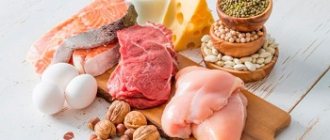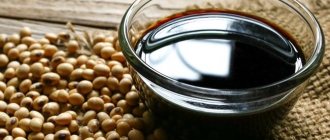Our body receives various vitamins from food that are necessary for the full functioning of intraorganic systems. But many vitamin substances are synthesized inside the body. These include vitamin B8. It’s not even really a vitamin, it’s the name of a vitamin-like substance that is produced in our body by intestinal bacteria through the processing of glucose raw materials. What is inositol and why does our body need it? Read below.
Now Foods, Inositol Capsules, 500 mg, 100 Capsules
from 504 ₽
More details
History of the discovery of vitamin B8
Johann Joseph Scherer
The first mention of this chemical compound dates back to the middle of the 19th century. According to some sources, the discoverer was the German chemist Justus von Liebig (1848), but more often they say that the compound was discovered by the German chemist and physician Johann Joseph Scherer (1850). A new substance was discovered in muscle fibers. That is why it was given the name “inositol”, which comes from the Greek “inos” - “fiber”.
Since the chemical structure of inositol is extremely similar to carbohydrates, at first the name “muscle sugar” was assigned to the compound. Only at the beginning of the 20th century the substance was given the status of vitamin B8.
However, already at the end of the 20th century it became known that the human body is capable of producing inositol in the required quantities. This was the reason why vitamin B8 was transferred to the category of vitamin-like substances. Due to its performance of a number of important functions for humans, vitamin B8 is today classified as a conditionally essential nutrient .
Synonymous names for vitamin B8:
- Inositol.
- Inositol.
- Cyclohexane-1,2,3,4,5,6-hexol (chemical name).
- Vitamin of youth.
Hypervitaminosis B8
Among the variety of vitamin substances, vitamin B8 is one of those that does not cause harm to the body. Laboratory studies have shown that it is almost impossible to overdose on inositol. Even in large doses, it is not capable of harming the body or causing intoxication. The maximum possible danger posed by inositol is allergic reactions, manifested by hives.
When the excesses leave the body, the allergic signs will disappear on their own. Inositol does not stay in tissues for a long time; after performing its functions, the vitamin-like substance leaves the body naturally.
Physicochemical properties of vitamin B8
The chemical formula of inositol is C6H12O6. In its pure form it is a white powdery crystalline substance. It is odorless and has a sweetish taste. Inositol is highly soluble in water and has low solubility in alcohols. Organic compounds are not able to dissolve inositol.
Vitamin B8 is well preserved at non-extreme temperatures and is not destroyed by exposure to air or direct sunlight. Non-hygroscopic.
In nature, inositol is represented by nine stereoisomers (spatial configurations), which are isolated from various vegetables, fruits, organs and animal tissues. The most common is mesoinositol or myoinositol . It is this form of vitamin B8 that is biologically active and provides all the beneficial properties of inositol. Mesoinositol is rarely found in free form; it is usually associated with phosphoric acid.
Vitamin B8 can be synthesized in the body from glucose. The heart, liver and kidneys actively produce inositol, which is subsequently transported to all cells and tissues. Human blood contains at least 4.5 mcg/ml vitamin B8. The tissues of the nervous system, the lens, the back wall of the eye and the tear fluid are especially rich in inositol.
Mysterious substance number 8 and its role in human life
Inositol is a white, sweet-tasting substance that resembles a crystalline powder in appearance. And despite what scientists call it, a lack of B8 leads to serious disruptions in the functioning of individual organs and entire systems.
This vitamin (or a vitamin-like substance) is a panacea for many problems: from nervous disorders to obesity and weak hair. And within each system of the human body, inositol has its own important role.
- Nervous system. One of the most important systems of the body that depends on B8 is the nervous system. Inositol has the power to transmit impulses at the intercellular level. With this knowledge, it becomes clear why B8 is prescribed for diseases of the musculoskeletal system caused by loss of sensitivity in nerve endings.
Inositol deficiency is almost always a problem with the functioning of the brain and spinal cord, as it is essential for the viability of brain cells. This failure is manifested by a decrease in concentration and efficiency of mental activity, the brain quickly gets tired, and the ability to remember sharply deteriorates.
It is B8 that is responsible for the exchange of impulses at the cellular level; its deficiency provokes a decrease in the sensitivity of nerve endings, and this is the cause of many serious diseases of the nervous system.
Vitamin B8 is called the safest antidepressant and natural sedative. Its beneficial effect on the body is felt by people with insomnia, neurosis, panic attacks, and various kinds of phobias.
By the way, researchers claim that women are capable of becoming depressed 2 times more often than men: 25% versus 12%. But adherents of a different point of view say: the figures are inconclusive and, most likely, inaccurate, since men are less likely to seek medical help than women. Therefore, it is not possible to talk about 100% accuracy of such indicators, which means that B8 as an antidepressant is equally needed by both women and men. True, the female body is more susceptible to stress due to physiological reasons (PMS, menopause).
But no matter what causes the bad mood, there is a rescue pill - vitamin B8. People with a sufficient supply of inositol are usually not afraid of depression, neuroses, phobias and other mental disorders.
- Digestion. If the daily diet is rich in products containing B8, any diet for weight loss will be accepted by the body more calmly - without stress and the desire to protect itself from “hunger” at any cost. At the level of the digestive system, with any nutritional program, inositol helps strengthen intestinal motility, regulate gastric motility, and promotes the normal formation of microorganisms necessary for digestion.
- Hepatology. For the liver, inositol serves as a protector against excessive growth of fat cells. Also, being an effective antioxidant, it takes on the blow of toxins, thereby significantly reducing the destructive effect of alcohol, antibiotics, hormonal drugs, helping to remove free radicals that negatively affect the structure of liver cells. On the other hand, B8 prevents cancer and the development of liver dystrophy in vegetarians following a protein-free diet, and is used as an effective medicine for hepatosis (replacement of normal liver cells - hepatocytes - with fatty ones) of any etiology. The ability of B8 to influence the secretory activity of the gallbladder in healthy and sick people has also been proven.
- Metabolism. Being, like most B vitamins, an active participant in enzymatic processes, it improves metabolism, including lipid metabolism. Promotes faster weight loss and prevents the development of obesity. This ability explains why it is important to increase your intake of vitamin B8 during a weight loss diet.
- For vessels. Inositol helps lower cholesterol, thins the blood and strengthens the walls of blood vessels. Taken together, this process provides an effective protection against atherosclerosis. And the ability to regulate blood pressure makes B8 an effective remedy against hypertension.
- For hair and skin. Simultaneously with the discovery of inositol, its effect on the condition of hair and skin was proven. Inositol in preparations for external use significantly improves the quality of the epidermis. For hair, its positive effect lies in the ability to enhance growth, protect against hair loss, and improve structure.
- Reproductive system. The quality of the reproductive system (female and male) also depends on the presence of the required amount of B8 in the body. In the male body, the vitamin is necessary for the formation of viable sperm. An interesting fact is that 100 g of sperm usually contain 53 mg of inositol, and if there is less of it in the seminal fluid, this means that the ability to fertilize is reduced. In the female body, inositol promotes the normal course of natural processes in the eggs. Often the cause of female infertility is a lack of inositol. In gynecology, B8 is part of the treatment program for polycystic ovary syndrome.
- Muscles and bones. Medicine is also known for the ability of B8 to influence the speed and quality of development of bone and muscle tissue, since inositol has the “gift” of enhancing protein synthesis. This property makes the vitamin an important component of the children's diet, and is also especially in demand after fractures, dislocations and other bone injuries.
- Obstetrics and pediatrics. Consuming less than the daily requirement of the vitamin by a pregnant woman can cause abnormal lung development in the fetus, and then provoke respiratory distress syndrome in the infant. Studies in pediatrics and neonatology have shown that B8, included in the diet of premature babies, gives a positive result in the treatment of bronchopulmonary dysplasia, retinopathy, sepsis, hemorrhage and other dangerous diseases. Used as a treatment for bipolar disorder in children and adolescents. In infancy, inositol plays the role of a “growth factor” and promotes the synthesis of other B vitamins.
- For diabetes. It is believed that diabetic polyneuropathy inevitably leads to loss of myo-inositol. Therefore, patients need an increased dose of inositol from the outside (sometimes it is necessary to double the daily dose). And increased consumption of the vitamin by diabetics has a positive effect on the cardiovascular system and the general condition of the patient. Some argue that vitamin B8 in combination with folic acid can prevent the risk of developing type 2 diabetes.
- Oncology. Hexaphosphate (a form of inositol in which a vitamin-like substance is present in plants) is a powerful antioxidant, which is what brought B8 fame as an antitumor agent. Researchers in many countries around the world are actively conducting experiments to confirm this theory. There is already evidence of the effectiveness of the use of inositol in the treatment of malignant neoplasms in the liver, rectum, and mammary glands. The vitamin protects against the risk of cancer problems in smokers, in particular those diagnosed with bronchial dysplasia. Laboratory studies have proven the positive effect of natural inositol in the fight against cancer cells in the pancreas and melanoma on the skin. The influence of B8 on the immune system helps protect the body from the development of malignant tumors.
Interesting Facts
The most active “consumers” of B8 are the lens and retina of the eye, as well as tissues of the nervous system. Tears and seminal fluid are most saturated with inositol. Organ tissues are capable of accumulating a supply of unused B8. The main “reserve funds” are concentrated in the spinal cord and brain. Thus, nature took care of being able to instantly smooth out the effects of stress on the body. Therefore, in order to preserve vitamin reserves in the brain, when there is increased mental activity, B8 is prescribed for preventive purposes.
What foods contain vitamin B8?
According to scientific research, inositol can be found in almost any food. Cantaloupe melon, oranges and other citrus fruits are especially rich in it. High levels of vitamin B8 are found in whole grains and cereals, legumes, nuts, yeast and liver, brown rice, soy flour and green leafy vegetables. Myoinositol is found in large quantities in the liver, internal organs and meat of animals, as well as in milk.
Foods rich in vitamin B8
It is noteworthy that vitamin B8 is found in the milk of mammals. For example, in the milk of nursing mothers, the concentration of inositol is in the range of 12-48 mg/100 ml, and in cow's milk it contains 4-11 mg/100 ml. Therefore, even newborns receive this vital compound in the required quantity.
Daily requirement for vitamin B8
Standard intake of vitamin B8 for children and adults
Inositol deficiency has never been demonstrated in humans. It is believed that the average human diet contains 300-1000 mg of vitamin B8. At the same time, the body itself is capable of producing 2-4 grams of inositol per day. Taking high doses of vitamin B8 orally can cause diarrhea.
The recommended daily dosage should be increased for diabetes, alcohol abuse and coffee lovers.
Daily norm
Any vitamin has its own daily requirement. Although vitamin compounds are beneficial for the body, if the dosage is exceeded, any beneficial substance turns into harmful and can cause intoxication and other adverse consequences. Vitamin B8 cannot be classified as a particularly toxic substance, however, it also has its own daily requirements.
Table 1. Daily intake of vitamin B8
| Patient category | Daily value of B8, mg/d |
| Children 0-12 months | 30-40 |
| 1-3 years | 50-60 |
| 4-6 year old children | 80-100 |
| At 7-18 years old | 200-500 |
| Adults | 500 |
Vitamin B8 is synthesized in the body, therefore, with the right diet, a person has enough of it. Increased dosages of inositol (up to 8 g/d) are required for people in the following cases:
- in a state of depression, stressful experiences or psychological overstrain;
- in sports, if intensive training is expected for athletes;
- with increased mental stress;
- to improve memory, especially during sessions and exams for students;
- for diabetes;
- in the presence of pathologies of blood vessels, liver or intestines;
- with frequent abuse of alcohol or fast food;
- pregnant and lactating women;
- when taking hormonal drugs and other drug therapy.
Also, dosages need to be increased if visual stress increases, with dislocations, fractures or severe bruises, or when drinking large amounts of water. In case of severe deficiency, which is extremely rare, you can resort to the help of inositol preparations, taking them according to the instructions.
Vitamin B8 - why the body needs it
Although vitamin B8 is not as widely advertised as other members of the B group, inositol is an organic component of every cell membrane. It functions similarly to choline and is involved in a wide range of bioactive processes.
In experiments on laboratory rats and gerbils, it was shown that vitamin B8 deficiency leads to the development of lipodystrophy, hypolipidemia and fatty liver. This is due to the fact that inositol regulates the processes of transport and utilization of fats, primarily cholesterol. In addition, vitamin B8 acts as a catalyst for a large number of metabolic reactions in all tissues of our body. And when inositol phosphate is broken down, the energy needed by the body is formed. This, by the way, also distinguishes inositol from other vitamins, the energy value of which is zero.
Beneficial properties of vitamin B8:
- It is a structural component of all cell membranes and ensures the integrity and normal functioning of cells.
- Maintains the potential (ionic charge) of the cell membrane.
- Provides the transport function of membranes of all cells.
- Takes part in the processes of formation of new cells (in particular in the process of gene expression).
- Participates in the intracellular control of the concentration of calcium ions (Ca2+).
- Regulates lipid transport and fat catabolism. Protects the liver from excessive accumulation of fat in it. Reduces cholesterol levels.
- Strengthens the walls of blood vessels.
- Participates in the exchange of copper and zinc.
- Supports peristalsis of the gastrointestinal tract.
- Increases the activity of neurotransmitters: serotonin, dopamine, norepinephrine, acetylcholine, GABA. Ensures normal impulse transmission between nerve cells. Improves concentration, memory and attention, stimulates the cognitive activity of the nervous system. Has antidepressant properties and improves mood.
- Necessary for the normal functioning of the hormone insulin.
- Maintains healthy skin and hair.
- Prevents the development of dystrophy and reduces the risk of malignant tumors.
Need for inositol
For inositol, as well as for its “twin” choline, there are no recommended doses (yet). As already mentioned, the daily requirement, depending on the impact of stress, is 4-8 grams.
Approximately 3/4 of this amount is produced by the body, but only if the mucous membranes of the stomach, kidneys, liver, nerve and brain cells are healthy and sufficiently supplied with nutrients.
If there is a lack of vitamins, microelements, protein or high-quality fatty acids in the body, then the synthesis of vitamin B8 stops. Inositol's worst enemy is caffeine. These substances absolutely do not get along with each other. Unfortunately, inositol is less stable than caffeine. The first cup of strong coffee in the morning or afternoon is still neutralized by the immune systems of the gastrointestinal tract or cells. The second cup is more dangerous, not to mention the third or fourth. It can destroy a quarter of the daily intake of this vitamin. Those who drink excessive amounts of water (more than two and a half liters per day) also lose inositol, which is excreted in the urine. Inositol and medications, especially sulfonamides, destroy them. Due to their effects, the normal concentration of vitamin B8 in the blood (0.7 mg per 100 ml) can be halved. They have a particularly negative effect on the inositol content in the cerebral fluid (2.7 mg per 100 ml). From this fluid, brain cells receive important nutrients during metabolism.
Vitamin B8 during pregnancy
During pregnancy, inositol ensures the formation of full-fledged cells in the new organism. In combination with other B vitamins, inositol ensures the normal formation and development of fetal nervous tissue. With further intrauterine development, vitamin B8 is included in the development of the cardiovascular and digestive systems, ensuring the health of the child’s skin and hair.
Despite the significant role of inositol for a pregnant woman and her baby, vitamin B8 is usually not included in vitamin and mineral complexes for pregnant women and women planning pregnancy. The expectant mother obtains the required amount of this compound from endogenous synthesis and food consumed.
Areas of application of inositol
People who are far from medicine sometimes do not understand what inositol is and what its price is, and also have no idea where it can be used. There are many ways to use vitamin B8. Indications for the use of its drugs are the conditions specified in the instructions, such as:
- pathologies of the reproductive sphere, to alleviate premenstrual syndrome;
- polycystic ovary syndrome;
- hepatitis and other liver diseases;
- unbalanced or poor diet;
- insulin resistance or type 2 diabetes;
- vitamin deficiency;
- to increase female/male fertility;
- in complex therapy of mental disorders;
- for weight loss, restoration of metabolism;
- in complex therapy of oncological pathologies.
Inositol preparations are indispensable in the treatment of problem hair. The vitamin strengthens and restores hair structure, prevents baldness, which is why it is often included in cosmetic products for hair and skin care. If the hair becomes dull, begins to fall out and breaks, then these signs indicate vitamin deficiency. To quickly restore your hair, it is recommended to add inositol powder directly to your shampoo.
Inositol is also used in sports. A sports career forces professional bodybuilders to sit on a low-carbohydrate diet while simultaneously using courses of insulin, supplementing all this with inositol. This vitamin prevents the development of hypoglycemia, regulates the central nervous system, stimulates circulation and blood synthesis. Pharmaceutical forms of inositol are produced in ampoules, capsules or powder form in the form of dietary supplements. They are usually taken at a dose of 500-1500 mg/d before breakfast.
Use of vitamin B8 in medicine
Inositol is extremely rarely used as monotherapy (as the only treatment). However, very often they complement treatment, and such therapy demonstrates excellent results.
Indications for use of vitamin B8:
- Diabetes mellitus (including pain and decreased tissue sensitivity to insulin).
- Asthenia.
- Increased mental and physical stress.
- Mental disorders, including panic attacks, depression, schizophrenia, anxiety, bipolar disorder, bulimia, obsessive-compulsive disorder.
- Insomnia (usually in combination with green tea extract, L-theanine or hydroxytryptophan 5-HTTP).
- Visual impairment associated with reduced retinal nutrition.
- Attention deficit hyperactivity disorder (ADHD) in children.
- Alzheimer's disease.
- Autism.
- High blood cholesterol levels.
- Liver diseases and cholelithiasis.
- Disorders of the gastrointestinal tract (including reduced peristalsis and constipation).
- Hypertension and circulatory disorders.
- Dermatological diseases (including eczema and psoriasis).
- For the prevention of cancer and other malignant neoplasms. Recovery after radiation or chemotherapy.
- Alopecia (baldness) and other hair problems.
- Disorders of the sex glands, infertility.
- Polycystic ovary syndrome (take 2 times a day, 2 grams).
- Overweight and obesity.
In a Russian pharmacy it is quite difficult to find pure vitamin B8 in ampoules or tablets. Pure inositol is usually available in capsules. It is also part of multicomponent preparations.
Vitamin B8 preparations:
- Inofert (30 sachets, inositol 1000 mg + folic acid 0.1 mg, manufacturer - Humana Pharma International, Italy).
- Fertina (30 sachets, inositol 1000 mg + folic acid 0.1 mg, manufacturer - Fine Foods & Pharmaceuticals, Finland).
- Myo-inositol for women (120 capsules, 500 mg each, manufacturer: Fairhaven Health, USA).
- Inositol (100 capsules, 500 mg, manufacturer: Now Foods, USA).
- Inositol (100 capsules of 750 mg, manufacturer - Jarrow Formulas, USA).
- Inositol (100 capsules of 500 mg, manufacturer - Nature's Way, USA).
- Inositol (100 capsules of 500 mg, manufacturer - Solgar, USA).
- Inositol Powder (powder 227 or 454 grams, manufacturer - Healthy Origins, USA).
- Inositol Powder Cellular Health (powder 113, 227 or 454 grams, manufacturer - Now Foods, USA).
- Pure Inositol Powder (powder 226.8 grams, manufacturer - Source Naturals).
Vitamin B8 preparations
Domestic preparations based on vitamin B8 (inositol) are unknown.
Tips for choosing supplements
The vitamin can be purchased in powder form or in tablet (capsule) form. The capsule is much more convenient to take; it already contains the required dosage for an adult. But the powder is convenient for those whose whole family (i.e. people of different ages) takes the supplement.
You can buy dietary supplements in ampoules, but they are usually used in cases of emergency recovery, for example, after sports injuries, and contain additional painkillers and anti-inflammatory components.
Inositol supplements may contain additional vitamins and microelements, whose effect is enhanced when taken together.
Lack of vitamin B8 in the body
Vitamin B8 deficiency has only been reproduced in laboratory animal studies. No clinically significant inositol deficiency has been identified in humans.
Based on experimental data, it was found out what a lack of vitamin B8 :
- Male sterility and arrest of sperm production.
- Dermatitis, eczema, psoriasis and other skin problems.
- Weakness, dullness and hair loss.
- Eye diseases and visual impairments.
- Excess copper in the body, which leads to insomnia, anxiety, depression and increased irritability.
- Cognitive disorders: decreased memory and attention, impaired thinking and speech.
- Neurological complications in patients with diabetes mellitus.
- Constipation due to weakness of the muscle layer of the intestines.
- Reduced fertility in women, infertility.
- Increased blood cholesterol levels.
Brief characteristics of inositol
Advantages
- Is an essential nutrient
- Helps with diabetes and metabolic syndrome
- Increases fertility, helps treat infertility and reduces symptoms of polycystic disease in women
- Protects the brain and nerves
- Reduces depression and anxiety
Flaws
Related articles:
- Liver detoxification phases
- How to replace metformin: natural alternatives
- May not work as well for men with diabetes
- May cause nausea, digestive problems and fatigue
- Does not improve cognitive problems and mania
Inositol is effective in pregnancy planning to improve fertility in both women. so do men
Interaction of vitamin B8 with other substances
- Caffeine, tea, alcohol and antibiotics inhibit the body's production and reduce the absorption of inositol from food. Therefore, if you are exposed to one or more of these substances, you should take additional doses of vitamin B8.
- A combination of vitamin B8 with choline, vitamin E or any vegetable oil is recommended. This combination accelerates the transition of inositol to its active form, and the complex of vitamins B8 + B4 forms lecithin, which is beneficial for the body.
- In combination with melatonin, it helps normalize sleep and circadian rhythms (sleep/wake).
- In combination with phytic acid (a derivative of inositol), an increase in the anti-cancer properties of vitamin B8 is observed.
- Reduces the side effects of lithium.
- Estrogen drugs sharply reduce the production and absorption of vitamin B8.
Vitamin B8 is a “fighter of the invisible front.” We talk about it little, but this does not prevent inositol from performing a huge list of important functions. The health of the nervous, digestive, cardiovascular and reproductive systems, skin and hair, protection against cancer and maintenance of normal cholesterol levels is largely due to vitamin B8.
Learn more about the authors of this article.
4.7 / 5 ( 8 votes)
Importance for the body
Vitamin B8 is extremely beneficial for the male body. With regular consumption of foods containing vitamins B8, a man improves his health and prevents many pathologies. For women, inositol is needed as a prophylactic agent that protects against mental disorders, premenstrual syndrome or causeless anxiety.
Vitamin B8 is needed to participate in many intraorganic processes that are of no small importance:
- prevents the development of skin and hair pathologies;
- normalizes blood pressure and cholesterol levels;
- prevents hair loss, protects it from aggressive external influences (varnish, sun, etc.);
- an active participant in protein synthesis, which helps reduce the risks of developing various pathologies;
- due to the normalization of metabolic and metabolic processes, vitamin B8 promotes weight loss;
- is able to accumulate in the cellular structures of the brain, which improves memory and concentration;
- improves gastrointestinal activity;
- normalizes metabolic processes;
- Inositol is extremely useful for the prevention and relief of nervous system disorders - insomnia, depression, excessive irritability;
- strengthens vascular walls, prevents thrombosis and obesity, the formation of atherosclerosis;
- by maintaining a moderate content of inositol in the body, the development of eye pathologies is prevented, eye fatigue is reduced, and vitamin B8 protects vision from the effects of aggressive factors;
- nerve impulse conduction improves;
- It is impossible to overestimate the benefits of inositol for the reproductive system; in the presence of infertility, a deficiency of this vitamin-like substance is often detected;
- promotes the removal of fat from the liver and other tissues in obesity;
- very important during periods of active childhood growth, as it participates in the formation of muscle fibers and bone structures.
The importance of inositol, or vitamin B8, is extremely high, and for all intraorganic systems. In the right dosage, it is a panacea for various problems - from hair loss to obesity.
Main beneficial properties
Inositol has many healing properties, but there are some qualities that are especially strong.
- A valuable quality of inositol or vitamin B8 is its ability to cope well with depressive conditions. Today, depression and stress disorders are quite common. In the complex treatment of serious depression, an enhanced formula is often prescribed - Choline + Inositol. This complex quickly relieves symptoms and neutralizes the consequences of mental disorders or severe depression even after stopping the course of antidepressant medications.
- An indispensable tool for normalizing metabolism and lipid metabolism. If you need to lose weight, then you should include inositol in complex therapy for weight loss, since the vitamin actively improves material exchange and metabolic processes.
- Vitamin B8 copes well with excessive anxiety. If we compare the medications prescribed today for anxiety, they have a lot of side reactions and contraindications, while inositol drugs do not cause side effects and cope well with panic attacks.
- Effectively fights bulimia. People suffering from this disease constantly overeat and then artificially induce vomiting. If you take inositol in a higher dosage (18 g) with this pathology, then depression and anxiety go away, and the tendency to overeat caused by bulimia decreases.
- Reduces the severity of PMS. Women should take vitamin supplements to reduce irritability and mood swings that occur a few days before their period.
Often, medications containing various forms of inositol are prescribed to women in the complex therapy of polycystic ovary syndrome. This syndrome develops against the background of hormonal imbalances and often causes weight gain, menstrual irregularities and infertility.
The beneficial properties of B8 are described in this video:
Features of metabolism and absorption
Vitamin B8 enters the body in two ways - as part of foods or through synthesis by its own organs. When ingested with products containing inositol, the vitamin is broken down in the small intestine under the influence of enzymes (phytase). After splitting, it is distributed throughout the bloodstream, and the excess leaves the body with urine.
The body produces about 70% of the daily requirement of inositol. Its synthesis is carried out from incoming glucose, and it is produced by the muscle tissue of the myocardium, kidneys or liver and other organs. Then the substance is absorbed into the bloodstream and carried with it to all intraorganic structures that especially need this vitamin.
The largest volume (4.5 mcg/ml) of the vitamin is always present in the blood as a reserve reserve for organs that cannot synthesize it themselves. In cells, the vitamin-like substance is contained in the form of protein-fat complexes or salts. The biochemistry of inositol makes it resistant to acid and alkaline influences, but under high-thermal influence, the vitamin formula undergoes transformation, up to complete destruction.
Substances such as caffeine or medications (estrogens and sulfonamides) can affect the effectiveness and degree of absorption. Tea and various energy drinks can also destroy vitamin molecules, so people with a deficiency of this substance should pay special attention to this factor.
There are a few tricks to remember to enhance the digestibility and usefulness of B8:
- Vitamin B8 ideally combines with tocopherol (E);
- in combination with B4 (choline) it forms a substance - lecithin;
- in combination with other representatives of the B-group, it helps to strengthen all components.
While restoring normal levels of the vitamin, you should give up tea, coffee, and energy drinks, replacing them with milk, compotes or jelly.
Now Foods, Choline & Inositol, 500 mg, 100 Capsules
from 622 ₽
More details
Side effects and interactions
Inositol supplements appear to be well tolerated by most people.
However, mild side effects have been reported at doses of 12 grams per day or more. These include nausea, gas, trouble sleeping, headache, dizziness and fatigue ().
Pregnant women in studies took up to 4 grams of inositol daily without any side effects, although more research is needed to draw definitive conclusions (, ).
There is also not enough research to determine the safety of supplements during breastfeeding. However, breast milk appears to be naturally rich in inositol ().
Additionally, it is unclear whether inositol supplements are safe for long-term use. In most studies, inositol supplements were taken for only a year or less.
As with any supplement, talk to your doctor before taking inositol.
Summary:
Inositol supplements are associated with a few mild side effects. More research is needed to determine its safety in pregnant and lactating women, as well as long-term use.
Inositol, where can I find you?
The body's daily need for inositol is determined by the quality of nutrition, physical activity and general health. The substance is transported throughout the body with blood. Doctors convince us that for the normal functioning of all systems, 1 ml of blood must contain at least 4.5 mcg of inositol.
Despite the fact that the body is able to produce almost 3/4 of the daily requirement of inositol on its own, this does not mean that there is no need to take care of a varied diet.
B8, like the other vitamins of the group, is a substance that must be supplied to the body daily with food, that is, 25% of inositol must be restored daily from external sources.
If you want to enrich your diet with vitamin B8, it is important to know which foods contain inositol in maximum doses. And these are representatives from different groups:
- animal origin;
- vegetables;
- fruits and dried fruits;
- cereals, seeds, legumes.
In the group of animal products, the most concentrated sources of B8 are by-products (heart, liver, brain). But when choosing meat products containing vitamins, it is important to take into account that the animals are naturally fed, since if there are steroids, antibiotics, pesticides and other chemicals in the livestock diet, meat and offal do more harm than good. High levels of inositol are found in fish, poultry and other types of meat.
Among the foods rich in vitamin B8 are eggs, nuts and seeds, which also contain fats that are healthy for the body.
Green vegetables are the healthiest food category. Most of them are excellent sources of inositol and other vitamins, microelements, antioxidants that neutralize free radicals (the cause of aging and the development of diseases). Researchers say that green leafy vegetables contain all the substances needed to prevent serious diseases (including cancer, diabetes, stroke, atherosclerosis, heart disease, obesity and others).
Many people know that bananas are a good source of potassium. But among other things, this exotic fruit is not inferior in terms of the amount of vitamin B8 it contains. Legumes (beans, peas, beans) and whole unrefined grains are a storehouse of inositol. An excellent supplier of nutrients is soy.
When creating a menu, you don’t have to worry about an overdose of inositol. Although most foods contain vitamin B8, they are not capable of causing hypervitaminosis. The human body, in the process of evolution, has adapted to such an abundance of the vitamin in nature.
Even if the body receives an excessive amount of a substance from food, it will soon excrete it in the urine.
When supplementing your diet with B8 products, it is important to remember: processing food at high temperatures leads to inevitable loss of inositol.
Products containing inositol
| Animal products | Meat (beef, veal, lean pork), offal (heart, liver, kidneys, brain), eggs, fish, caviar. |
| Legumes | Lentils, green peas, beans, soybeans. |
| Vegetables | Cabbage (cauliflower and white cabbage), onions, carrots, potatoes, green leafy vegetables. |
| Cereals | Wild rice, sprouted wheat, oats, barley. |
| Nuts and seeds | Peanuts, almonds, hazelnuts, walnuts, sunflower seeds, sesame. |
| Fruits | Orange, grapefruit, lemon, peach. |
| Dried fruits | Raisins, dried apricots, prunes, dates. |
| Berries | Melon, watermelon, gooseberry, blackberry. |
| Grocery | Sesame oil, yeast. |
Why does B8 deficiency occur?
As already noted, the body is able to produce approximately 75% of the daily requirement of inositol on its own. Meanwhile, scientists have identified the reasons why B8 production may be declining. A lack of fatty acids, protein, and some vitamins and minerals inhibit the formation of natural inositol.
In addition, alcohol, coffee and energy drinks have a detrimental effect on B8. Alcohol kills the microflora that produces vitamins in the body. Coffee and drinks with a similar tonic effect inhibit the process of inositol production, and as a result, the nervous system and brain lose the ability to relax, and nerve cells weaken.
The third negative factor is medications, in particular sulfonamides, antibiotics, estrogens.
Patients with diabetes mellitus need to increase the generally accepted daily intake of B8 - increased blood glucose levels cause a decrease in inositol levels.
If any of the above factors are present, it is important to maintain B8 levels slightly above the generally accepted daily value.
Daily norm
Under normal circumstances, it is enough for a person with more or less normal health to receive 500-1000 mg of vitamin B8 from food. The daily norm in this case is determined taking into account the person’s weight, age and gender, as well as his physical activity and health status.
For a healthy person, a minimum dose of inositol per day – 500 mg – may be sufficient for the full functioning of the body. But in some cases the norm is increased even to 8 grams per day.
Dose increases require:
- infants and adolescents during periods of intensive growth;
- people with alcohol addiction;
- after stress and a course of taking antibiotics, some other drugs that affect the microflora;
- people who consume large amounts of fluid (in particular athletes);
- patients with diabetes, chronic inflammation, meningitis, epidemic encephalitis.
Poor nutrition and bad habits also affect the process of absorption and production of B8 by the body.
How to understand that the body lacks a vitamin
A lack of any substance useful to the body usually manifests itself as discomfort or some kind of health problem. The most common “signals” of critically low B8 reserves range from nervousness and lack of normal sleep to baldness and developmental delays in children. Moreover, new experiments by scientists have confirmed the theory about the relationship between inositol deficiency and the effectiveness of other B vitamins.
It turns out that if the body does not have enough inositol, then the remaining elements labeled “B” (regardless of how much they have accumulated) almost completely lose their beneficial properties, and their effect on the body ceases.
Meanwhile, it is not necessary to urgently resort to the services of laboratories and donate blood for analysis to verify the lack of inositol. To begin with, you should listen to your own body and the SOS signals it sends. If a person experiences some of the following symptoms over a period of time, the condition may be caused by a B8 deficiency.
Potential signs of B8 deficiency:
- disruptions in the sleep cycle or its complete absence at night;
- sharp decrease in vision;
- nervousness and other mental disorders (including severe depression);
- inattention, absent-mindedness;
- rashes and dry skin;
- disorders of the digestive system (most often constipation);
- hair loss for no apparent reason;
- circulatory problems;
- increased cholesterol levels;
- muscle dystrophy;
- disorders of the reproductive system;
- dryness, brittleness and dullness of hair.
Is hypervitaminosis B8 possible?
Water-soluble vitamin B8 is one of the few substances that is practically incapable of harming the body. As numerous experiments have shown, an overdose of inositol is almost impossible. Of course, if we are not talking about an injection of a dose hundreds of times higher than the permissible norm.
B8, being a non-toxic element, even in fairly large quantities does not cause pathological changes in the body or poisoning. The maximum possible harm from inositol is an allergic reaction, manifested by urticaria.
Signs of allergies disappear along with the removal of excess B8 from the body. However, inositol belongs to those substances that do not accumulate for a long time in cells and tissues - it lingers only for a while, and after fulfilling its function, it is excreted from the body.
Beneficial properties of inositol
The list of “good deeds” of this vitamin is quite extensive:
- calms the nerves;
- protects the skin from exposure to microbes and parasites;
- increases mental activity;
- reduces hair loss;
- is an antidepressant;
- improves vision;
- strengthens the membrane of body cells;
- promotes the growth of infants' nerve cells;
- is a sleeping pill;
- necessary for sperm formation;
- controls fat metabolism in the liver;
- speeds up metabolism;
- breaks down fat.
Thanks to its calming effect, vitamin B8 helps relieve headaches
Vitamin B8 for women's health
Vitamin B8 is called the “women’s vitamin” because it has a beneficial effect on skin and hair. But its main purpose lies elsewhere.
Vitamin B8 moisturizes the skin, improves complexion
Inositol is useful to take during pregnancy (be sure to consult your doctor). This vitamin helps cope with depression, mood swings and other similar phenomena observed in women expecting a child. It is worth remembering that in large quantities inositol can cause uterine contractions.
As for women's health, inositol is needed at any age. For example, it will help to better cope with the unpleasant phenomena caused by menopause (depression, nervousness, insomnia), and will keep the skin elastic and hair thick and healthy longer. In addition, it will help avoid early menopause, which occurs due to ovarian depletion syndrome.
Inositol for children
A child needs vitamin B8 from the time he is in the womb. The useful element significantly reduces the risk of deformation of the fetal neural tube. In addition, it is necessary if the mother has diabetes.
Vitamin B8 ensures timely development of the fetus
Babies born prematurely have a high risk of developing bronchopulmonary dysplasia and retinopathy (eye disease). However, taking vitamin B8 can protect children from these diseases.
Infants primarily obtain inositol from breast milk. Therefore, it should be taken into account that if the child is bottle-fed, this vitamin must be present in the mixture.
Inositol is also needed by older children, because it is a growth vitamin. In other words, it promotes bone and muscle growth. Vitamin B8, improving thought processes, is indispensable for schoolchildren.











